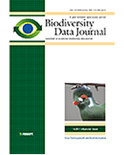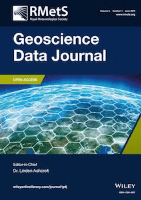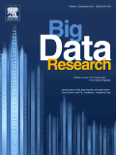
Scientific Data
Scope & Guideline
Bridging Disciplines with Premier Data Sharing
Introduction
Aims and Scopes
- Data Sharing and Accessibility:
The journal promotes the sharing of datasets to enhance transparency and reproducibility in research. It encourages authors to make their datasets publicly accessible, thus enabling other researchers to build upon their work. - Interdisciplinary Research:
Scientific Data covers a wide range of disciplines, including environmental science, climate studies, biology, and social sciences. This interdisciplinary approach allows for a broader application of datasets across different fields. - Methodological Rigor:
The journal emphasizes the importance of methodological rigor in data collection and processing. Authors are encouraged to provide detailed descriptions of their methodologies to ensure that datasets can be reliably reproduced. - Focus on High-Resolution Data:
Many published datasets feature high-resolution data, which is crucial for detailed analyses in various scientific fields, particularly in environmental and ecological research. - Longitudinal and Temporal Data:
The journal frequently publishes datasets that span long time periods, allowing for the analysis of trends and changes over time, which is particularly relevant for climate and environmental studies.
Trending and Emerging
- Machine Learning and AI Applications:
There is a growing trend towards datasets that leverage machine learning and artificial intelligence for data analysis. This includes datasets designed for training models, indicating a shift towards more computationally intensive methodologies. - Environmental Monitoring and Climate Change:
Numerous recent publications focus on datasets related to environmental monitoring and climate change impacts. This reflects an increased urgency in addressing climate issues and the need for comprehensive data to inform policy and decision-making. - Integrative and Multiscale Datasets:
Emerging datasets often integrate multiple data types and scales, providing a more holistic view of complex systems. This trend supports interdisciplinary research and enhances the understanding of interactions within ecosystems. - Citizen Science and Crowdsourced Data:
The journal is increasingly publishing datasets collected through citizen science initiatives. This trend highlights the potential of engaging the public in scientific research and expanding data collection efforts. - Real-Time and Near-Real-Time Data:
Recent publications have emphasized datasets that provide real-time or near-real-time data, particularly in climate and environmental monitoring. This trend is crucial for timely decision-making and response to environmental changes.
Declining or Waning
- Traditional Climate Models:
There has been a noticeable decline in datasets exclusively focused on traditional climate models. As the field evolves, there is a shift towards more integrated approaches that combine observational data with advanced modeling techniques. - Static Datasets:
The journal has seen a decrease in the publication of static datasets that do not incorporate temporal changes. There is a growing preference for dynamic datasets that capture changes over time, reflecting the need for real-time data in various applications. - Limited Geographic Focus:
Earlier publications often included datasets focused on specific geographic regions. Recently, there is a trend towards global datasets that provide broader applicability, which may lead to a decline in region-specific studies. - Single-Parameter Datasets:
There is a waning interest in datasets that focus solely on a single parameter without considering the broader context or interactions with other variables. Researchers are increasingly looking for multi-parameter datasets that offer comprehensive insights.
Similar Journals

Biodiversity Data Journal
Connecting data and conservation for a healthier ecosystem.Biodiversity Data Journal, published by PENSOFT PUBLISHERS, is a leading open-access platform that has been facilitating the dissemination of scientific knowledge since its inception in 2013. With a focus on enriching the fields of Agricultural and Biological Sciences, Animal Science and Zoology, Ecology, and Plant Science, this journal plays a pivotal role in promoting research outputs related to biodiversity, encompassing ecological data, species inventories, and conservation strategies. It has achieved commendable rankings in various categories, notably securing a Q2 rating in several key areas, indicating its growing influence within the academic community. The journal’s contribution to advancing the understanding of biodiversity is further enhanced by its commitment to open access, ensuring that vital research findings are widely accessible to researchers, professionals, and students worldwide. By publishing comprehensive datasets and innovative research, the Biodiversity Data Journal remains an essential resource for those looking to stay at the forefront of biodiversity science and environmental stewardship.

Methods and Protocols
Elevating standards in scientific inquiry and methodology.Methods and Protocols is a prestigious open-access journal published by MDPI, focusing on the critical domain of biochemistry, genetics, molecular biology, and biotechnology. Launched in 2018 and based in Basel, Switzerland, the journal provides a vital platform for sharing innovative methodologies and experimental protocols that advance scientific research and development. With an impressive Q2 ranking in multiple categories, including Biochemistry, Genetics and Molecular Biology, and Biotechnology, it fosters a collaborative environment for researchers and professionals to disseminate their findings. With a mission to enhance reproducibility and transparency in scientific inquiry, Methods and Protocols not only serves as an essential resource for academia but also contributes to the practical application of research in various industries. The journal's open-access model ensures that cutting-edge research is accessible to a global audience, thus promoting knowledge sharing and inspiring future innovations within the scientific community.

Geoscience Data Journal
Empowering researchers with transparent geoscience insights.Geoscience Data Journal is a pioneering platform published by Wiley, dedicated to the dissemination of high-quality geoscience data. Established as an Open Access journal since 2014, it provides a crucial resource for researchers, professionals, and students interested in the diverse fields of Earth and Planetary Sciences. With an impressive impact factor that places it in the Q2 category of Earth and Planetary Sciences for 2023, the journal ranks 33rd out of 195 in its category according to Scopus, situating it in the 83rd percentile of similar publications. Emphasizing transparency and accessibility, the journal encourages the sharing of data related to the geology, geophysics, and the evolving climate, driving forward the global conversation on sustainability and environmental stewardship. The journal's ongoing publication from 2015 to 2024 underscores its commitment to advancing research and knowledge in geoscience, making it an invaluable asset for anyone engaged in this dynamic and impactful field.

Communications for Statistical Applications and Methods
Bridging Theory and Practice in Statistical MethodologiesCommunications for Statistical Applications and Methods is a vital academic journal dedicated to advancing the field of statistics, with a particular focus on practical applications and methodologies. Published by the Korean Statistical Society, this journal has become a significant resource for researchers, practitioners, and students engaged in statistical sciences and its diverse applications in various fields including finance and modeling. Operating without an Open Access format, the journal is accessible through institutional subscriptions, allowing a broad audience to benefit from its insights. The journal covers works from its inception in 2017 to 2024, and although it currently ranks in the Q4 and Q3 quartiles across various mathematical and statistical categories, its commitment to quality research makes it a noteworthy platform for emerging trends and innovations. The journal not only serves to disseminate knowledge but also fosters collaboration among statisticians, ensuring that crucial advancements in statistical applications are communicated effectively.

Big Data Research
Unlocking the potential of big data.Big Data Research, published by Elsevier, is a leading academic journal dedicated to the exploration and advancement of Big Data methodologies and technologies. With an ISSN of 2214-5796, and a commendable impact reflected in its Scopus rankings—ranking Q2 in Computer Science Applications and Q1 in Information Systems—this journal offers a prominent platform for researchers and practitioners to share innovative findings in the realm of data science, analytics, and management. Since its inception in 2014, Big Data Research has fostered a multidisciplinary approach, addressing cutting-edge topics crucial for both academic inquiry and real-world applications. The journal's objectives include advancing the understanding of data-intensive systems, promoting essential methodologies for big data analytics, and enhancing data-driven decision-making processes across various industries. As an open access journal, Big Data Research is committed to disseminating knowledge widely, allowing researchers, professionals, and students to stay at the forefront of developments in this fast-evolving field. Its influence in the academic community is further underscored by a strong commitment to quality and relevance, making it an essential resource for anyone interested in the transformative power of big data.

SoftwareX
Advancing Software Solutions for a Global CommunitySoftwareX is an innovative open-access journal published by Elsevier that has been championing advancements in the fields of Computer Science and Software since its inception in 2015. With a focus on presenting high-quality research, SoftwareX aims to foster collaboration and knowledge exchange among researchers and practitioners, advancing the way software and tools are developed and disseminated within the community. This journal operates under a flexible access model, allowing broad visibility and accessibility to its diverse readership. Positioned in the Q2 and Q3 quartiles of the Scopus ranking system within the domains of Computer Science Applications and Software respectively, SoftwareX stands as an influential platform for sharing cutting-edge methodologies and innovations. The journal's aim is not only to serve as a repository of knowledge but also to embolden practitioners and scholars alike to engage with and implement findings that can accelerate progress within the realms of software engineering and application. Situated in Amsterdam, Netherlands, SoftwareX has embraced an international reach, welcoming submissions that address complex challenges through novel software solutions.

Synthetic Biology
Pioneering the Future of Biotechnology and EngineeringSynthetic Biology, published by Oxford University Press, is a leading open-access journal that has gained recognition since its inception, becoming a pivotal platform in the fields of Agricultural and Biological Sciences, Bioengineering, Biomaterials, Biomedical Engineering, and Biotechnology. With an ISSN of 2397-7000 and consistent contributions from innovative researchers, the journal has established itself as a Q1 journal in Agricultural and Biological Sciences and ranks notably across various engineering disciplines, making it an essential resource for cutting-edge research and interdisciplinary collaboration. Since becoming fully open access in 2016, it has broadened its reach, allowing easy access to groundbreaking findings that drive advancements in synthetic biology and its applications. The journal's commitment to high-quality, peer-reviewed content serves to inspire researchers, professionals, and students alike, fostering a rich academic community dedicated to exploring the complexities of biological systems and their synthetic counterparts.

Data in Brief
Bridging Disciplines with Essential Data Discoveries.Data in Brief is an esteemed open-access journal published by Elsevier that has been at the forefront of disseminating valuable and succinct research findings since its inception in 2014. With a focus on multidisciplinary and educational data, the journal serves as a vital platform for researchers, professionals, and students seeking quick access to high-quality data papers that complement larger research articles. Notably, Data in Brief holds a commendable rank of #40 out of 171 in the multidisciplinary category, placing it in the 76th percentile, which underscores its relevance and impact within the academic community. Operating with an open-access model, it ensures that research is readily available to a global audience, facilitating collaboration and innovation across various fields. The journal's commitment to providing a rich repository of easily digestible data makes it an essential resource for anyone interested in enhancing their research or knowledge base.

PeerJ
Fostering collaboration in Agricultural and Biological Sciences.PeerJ, with an ISSN of 2167-8359 and E-ISSN of 2167-8359, is a prominent open-access journal published by PEERJ INC since 2013. Based in the United States, PeerJ is dedicated to advancing knowledge across various disciplines, with a notable focus on Agricultural and Biological Sciences, Biochemistry, Genetics and Molecular Biology, Medicine, and Neuroscience. PeerJ has quickly established itself in the academic community, achieving impressive rankings such as Q1 in Agricultural and Biological Sciences and Q2 in both Biochemistry and Medicine in 2023. With its robust open-access model, PeerJ ensures widespread accessibility of cutting-edge research, facilitating collaboration and dissemination of findings that push the boundaries of scientific inquiry. The journal's impact and reach continue to grow, making it an essential resource for researchers, professionals, and students alike who are keen on contributing to and learning from cutting-edge scientific discourse.

Earth System Science Data
Connecting Data and Discovery in Earth SciencesEarth System Science Data, published by COPERNICUS GESELLSCHAFT MBH, is a premier open access journal dedicated to advancing the field of Earth and planetary sciences. With an impressive impact factor, it holds a distinguished Q1 ranking in the Earth and Planetary Sciences category, underscoring its significance within the scientific community. Established in 2009, the journal has been committed to providing a platform for the dissemination of high-quality, freely accessible research data that supports the understanding and management of Earth's complex systems. The journal welcomes contributions that offer extensive datasets, innovative methodologies, and collaborations that push the frontiers of Earth sciences, making it an essential resource for researchers, professionals, and students alike. Based in Göttingen, Germany, Earth System Science Data remains a vital asset for those seeking to engage with and contribute to impactful scientific discourse across the globe.